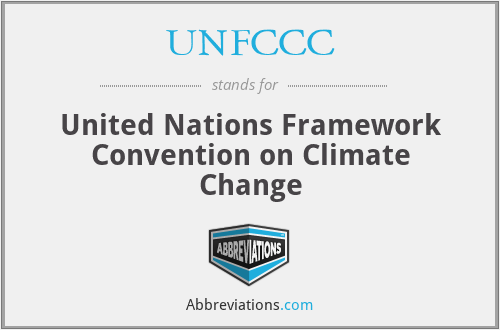What does UNFCCC mean in United Nations?
This page is about the meanings of the acronym/abbreviation/shorthand UNFCCC in the Governmental field in general and in the United Nations terminology in particular.
Submitted by acronimous on October 21, 2009
Translation
Find a translation for United Nations Framework Convention on Climate Change in other languages:
Select another language:
- - Select -
- 简体中文 (Chinese - Simplified)
- 繁體中文 (Chinese - Traditional)
- Español (Spanish)
- Esperanto (Esperanto)
- 日本語 (Japanese)
- Português (Portuguese)
- Deutsch (German)
- العربية (Arabic)
- Français (French)
- Русский (Russian)
- ಕನ್ನಡ (Kannada)
- 한국어 (Korean)
- עברית (Hebrew)
- Gaeilge (Irish)
- Українська (Ukrainian)
- اردو (Urdu)
- Magyar (Hungarian)
- मानक हिन्दी (Hindi)
- Indonesia (Indonesian)
- Italiano (Italian)
- தமிழ் (Tamil)
- Türkçe (Turkish)
- తెలుగు (Telugu)
- ภาษาไทย (Thai)
- Tiếng Việt (Vietnamese)
- Čeština (Czech)
- Polski (Polish)
- Bahasa Indonesia (Indonesian)
- Românește (Romanian)
- Nederlands (Dutch)
- Ελληνικά (Greek)
- Latinum (Latin)
- Svenska (Swedish)
- Dansk (Danish)
- Suomi (Finnish)
- فارسی (Persian)
- ייִדיש (Yiddish)
- հայերեն (Armenian)
- Norsk (Norwegian)
- English (English)
Definition
What does UNFCCC mean?
- United Nations Framework Convention on Climate Change
- The United Nations Framework Convention on Climate Change (UNFCCC) is an international environmental treaty adopted on 9 May 1992 and opened for signature at the Earth Summit in Rio de Janeiro from 3 to 14 June 1992. It then entered into force on 21 March 1994, after a sufficient number of countries had ratified it. The UNFCCC objective is to "stabilize greenhouse gas concentrations in the atmosphere at a level that would prevent dangerous anthropogenic interference with the climate system". The framework sets non-binding limits on greenhouse gas emissions for individual countries and contains no enforcement mechanisms. Instead, the framework outlines how specific international treaties (called "protocols" or "Agreements") may be negotiated to specify further action towards the objective of the UNFCCC. Initially, an Intergovernmental Negotiating Committee (INC) produced the text of the Framework Convention during its meeting in New York from 30 April to 9 May 1992. The UNFCCC was adopted on 9 May 1992 and opened for signature on 4 June 1992. The UNFCCC has 197 parties as of December 2015. The convention enjoys broad legitimacy, largely due to its nearly universal membership.The parties to the convention have met annually from 1995 in Conferences of the Parties (COP) to assess progress in dealing with climate change. In 1997, the Kyoto Protocol was concluded and established legally binding obligations for developed countries to reduce their greenhouse gas emissions in the period 2008–2012. The 2010 United Nations Climate Change Conference produced an agreement stating that future global warming should be limited to below 2.0 °C (3.6 °F) relative to the pre-industrial level. The Protocol was amended in 2012 to encompass the period 2013–2020 in the Doha Amendment, which as of December 2015 had not entered into force. In 2015 the Paris Agreement was adopted, governing emission reductions from 2020 on through commitments of countries in Nationally Determined Contributions (NDCs), with a view of lowering the target to 1.5 °C. The Paris Agreement entered into force on 4 November 2016. One of the first tasks set by the UNFCCC was for signatory nations to establish national greenhouse gas inventories of greenhouse gas (GHG) emissions and removals, which were used to create the 1990 benchmark levels for accession of Annex I countries to the Kyoto Protocol and for the commitment of those countries to GHG reductions. Updated inventories must be submitted annually by Annex I countries. "UNFCCC" is also the name of the United Nations Secretariat charged with supporting the operation of the Convention, with offices in Haus Carstanjen, and the UN Campus (known as Langer Eugen) in Bonn, Germany. From 2010 to 2016 the head of the secretariat was Christiana Figueres. In July 2016, Patricia Espinosa succeeded Figueres. The Secretariat, augmented through the parallel efforts of the Intergovernmental Panel on Climate Change (IPCC), aims to gain consensus through meetings and the discussion of various strategies.
Embed
Citation
Use the citation below to add this abbreviation to your bibliography:
Style:MLAChicagoAPA
"UNFCCC." Abbreviations.com. STANDS4 LLC, 2024. Web. 19 Apr. 2024. <https://www.abbreviations.com/term/558924>.



Discuss this UNFCCC abbreviation with the community:
Report Comment
We're doing our best to make sure our content is useful, accurate and safe.
If by any chance you spot an inappropriate comment while navigating through our website please use this form to let us know, and we'll take care of it shortly.
Attachment
You need to be logged in to favorite.
Log In